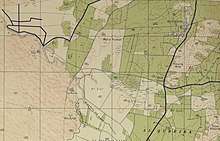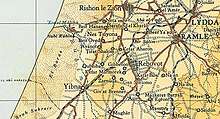Beit Oved
Beit Oved (Hebrew: בֵּית עוֹבֵד, lit. House of Worker or House of Obed) is a moshav in central Israel. Located on the outskirts of Ness Ziona, it falls under the jurisdiction of Gan Raveh Regional Council. In 2018 its population was 253.[1]
Beit Oved בֵּית עוֹבֵד | |
|---|---|
 Beit Oved  Beit Oved | |
| Coordinates: 31°55′18.48″N 34°46′24.96″E | |
| Country | |
| District | Central |
| Council | Gan Raveh |
| Affiliation | Moshavim Movement |
| Founded | 1933 |
| Population (2018)[1] | 253 |
Etymology
The name is based on one of two biblical passages:And the ark of God remained with the family of Obed-edom in his house three months; and the LORD blessed the house of Obed-edom, and all that he had. (1 Chronicles 13:14)[2] or: He that tilleth his ground shall have plenty of bread; but he that followeth after vain things is void of understanding. (Proverbs 12:11)[3]
History
The moshav was founded in 1933 by a group of veteran farmers.[4] It was established as part of the Settlement of the Thousand plan, a response to the 1929 Palestine riots in which small farm settlements were built on the outskirts of Jewish towns and moshavot to improve security.[5]


Notable residents
- David Tabak (1927–2012), Olympic runner
References
| Wikimedia Commons has media related to Beit Oved. |
- "Population in the Localities 2018" (XLS). Israel Central Bureau of Statistics. 25 August 2019. Retrieved 26 August 2019.
- 1 Chronicles Chapter 13 Mechon Mamre
- Proverbs Chapter 12 Mechon Mamre
- Jewish National Fund (1949). Jewish Villages in Israel. Jerusalem: Hamadpis Liphshitz Press. p. 191.
- Settlement of the Thousand Archived 2011-07-21 at the Wayback Machine Kvutzat Shiller